外研版七年级上册Module 7 Computers Unit 2 when do you use a computer课件(共46张PPT)
文档属性
| 名称 | 外研版七年级上册Module 7 Computers Unit 2 when do you use a computer课件(共46张PPT) |
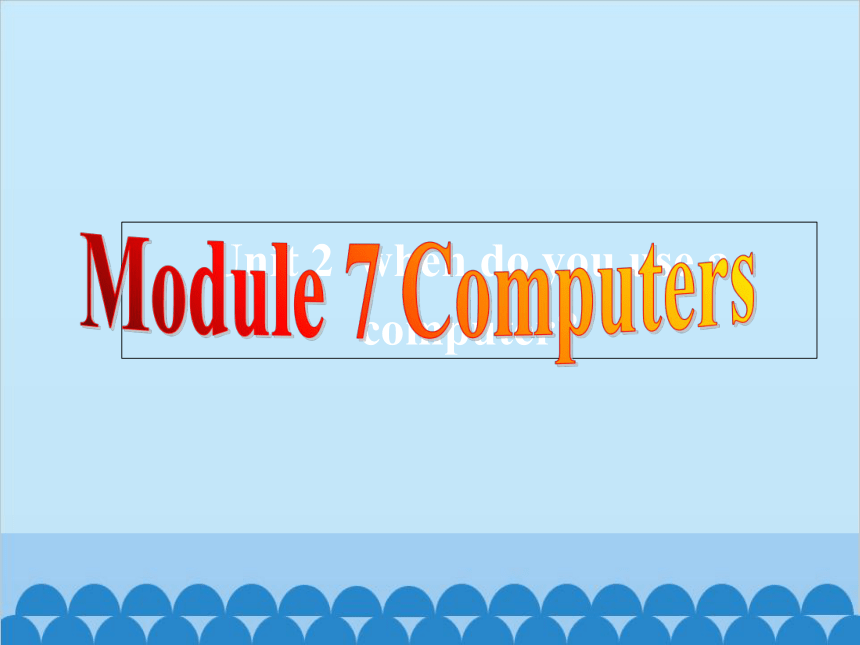
|
|
| 格式 | ppt | ||
| 文件大小 | 1.5MB | ||
| 资源类型 | 教案 | ||
| 版本资源 | 外研版 | ||
| 科目 | 英语 | ||
| 更新时间 | 2022-10-09 15:37:27 | ||
图片预览

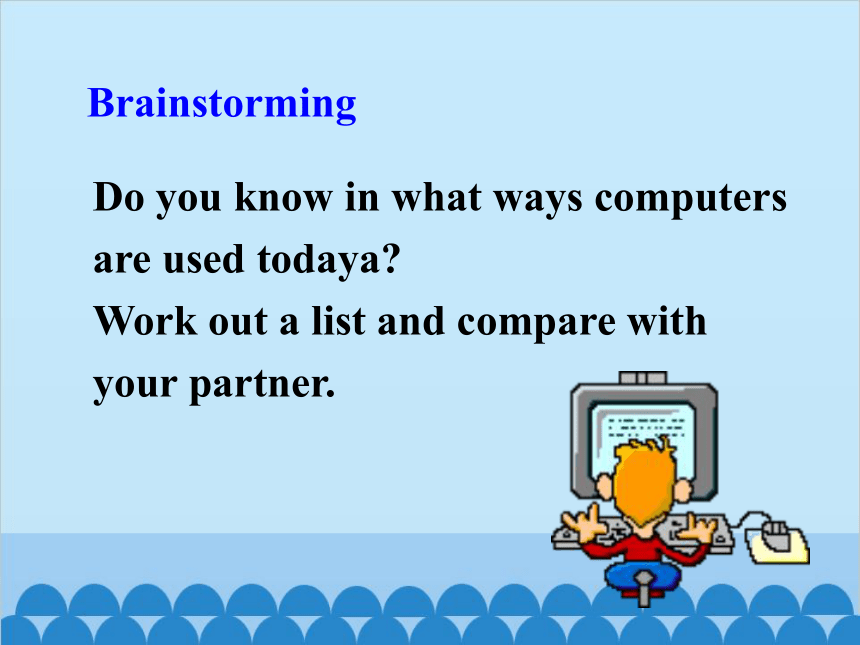
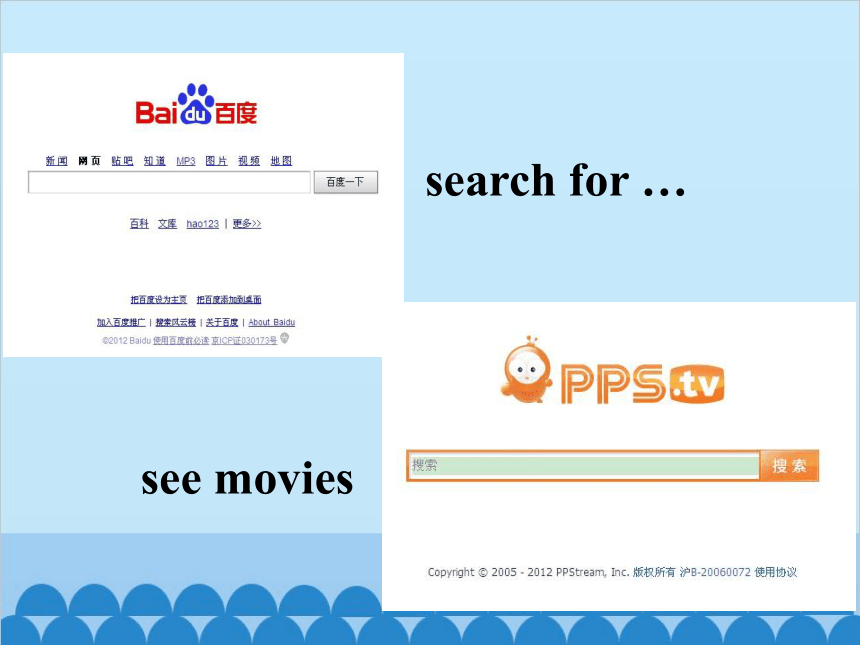

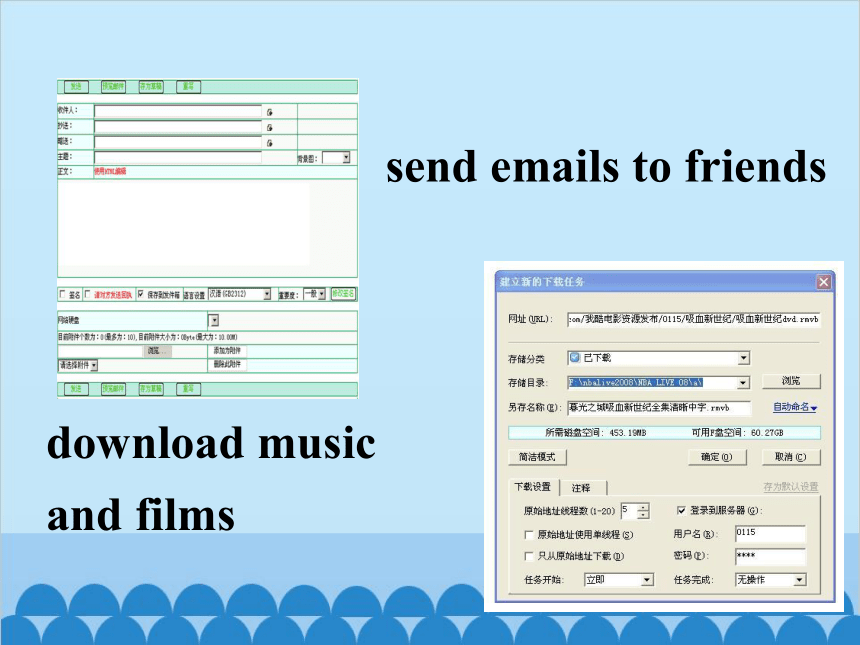


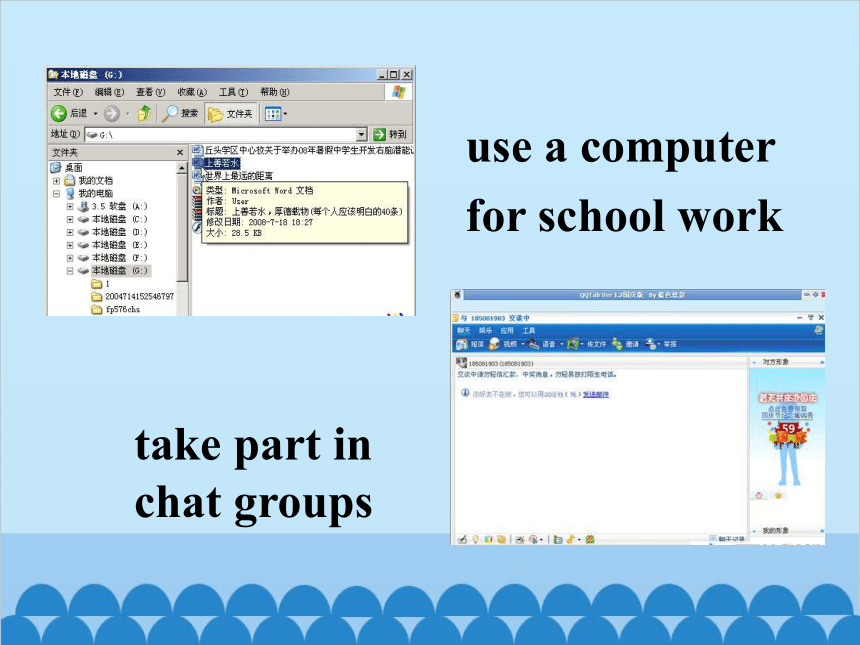

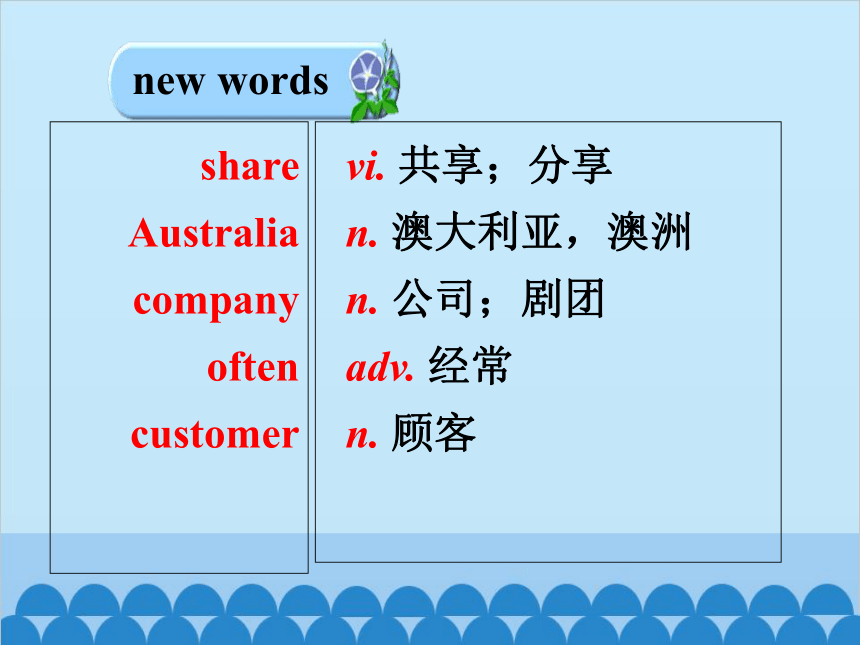
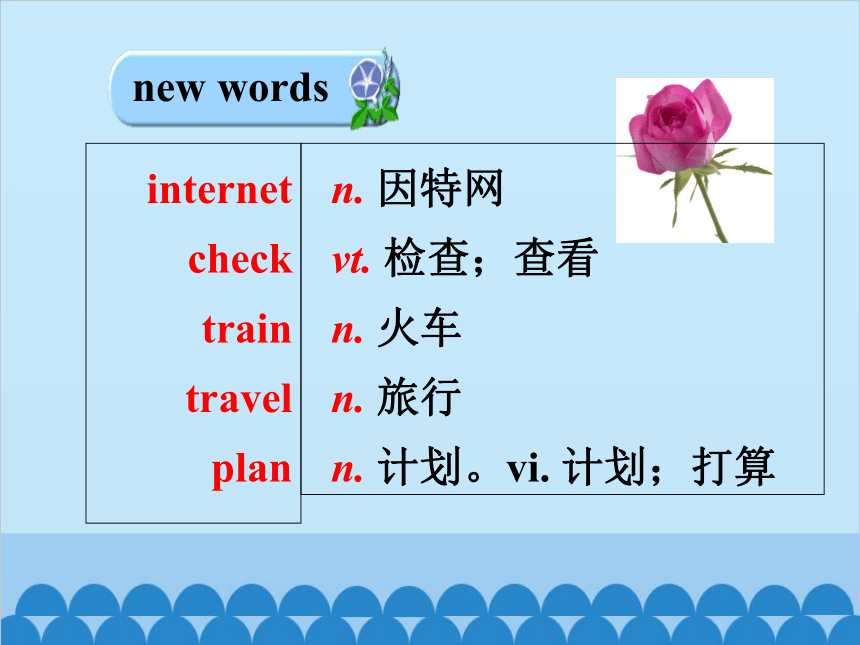
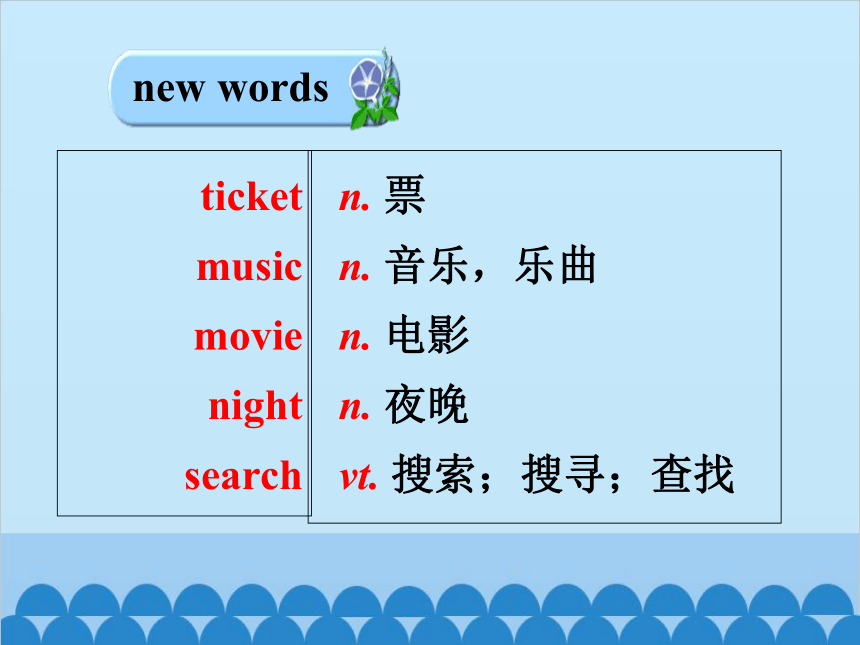
文档简介
(共46张PPT)
Unit 2 when do you use a computer
Do you know in what ways computers
are used todaya
Work out a list and compare with
your partner.
Brainstorming
search for …
see movies
listen to music
read books and magazines
send emails to friends
download music
and films
buy things online
play games on
the computer
draw pictures
look at photographs
on the computer
use a computer
for school work
take part in
chat groups
Review
Read the words and expressions loudly.
new words
share
Australia
company
often
customer
vi. 共享;分享
n. 澳大利亚,澳洲
n. 公司;剧团
adv. 经常
n. 顾客
internet
check
train
travel
plan
n. 因特网
vt. 检查;查看
n. 火车
n. 旅行
n. 计划。vi. 计划;打算
new words
ticket
music
movie
night
search
n. 票
n. 音乐,乐曲
n. 电影
n. 夜晚
vt. 搜索;搜寻;查找
new words
next
search for
information
email
send
game
搜寻;查找
n. 信息
n. 电子邮件
vt. 发送
n. 游戏
new words
next
sometime
cinema
clothes
visit
holiday
adv. 有时候;不时
n. 电影;电影院
n. 衣服(总称)
vt. 探望;参观
n. 假日;节日
new words
next
1 Who can use the computer on Sunday
2 Who shares a computer with his father
3 Who has a friend in Australia
Listen, read and answer.
Mike.
Jack.
Alice.
1
There is a computer in my home, and my father and I share it. My father is a manager of a company, so he often talks to his customers on the computer. He also goes on the Internet to check the times of trains, make travel plans, and buy tickets, I listen to music or watch movies on it every Friday night. -Jack
There is no computer in my home. I can only use it at school. On the Internet, I search for information, do my homework and check my email. I have a friend in Australia. I can see her and talk to her on the Internet. —Alice
We have a computer at home. My parents don’t use it. I can use it on Sundays. I send email to my friends and play computer games. But sometimes I play a lot of games and my mother doesn’t like it. —Mike
1. Jack’s father uses the computer
every Friday night.
2. Alice checks emails at home.
3. Mike likes playing computer games.
4. Mike and his parents use their
home computer.
√
×
×
×
Jack
at school
Mike’s parents don’t
2.Check (√) the true sentences.
Mike
s
buy
check
go on
make
play
share
talk to
search for
watch
work for
a company
a computer
customers
email
games
information
the Internet
movies
tickets
travel plans
在一家公司上班
共用一台电脑
和顾客讲话
检查邮件
玩游戏
搜索信息
上网
看电影
买票
制定旅行计划
Match the words and expressions in Column A with those in Column B .
3
来”,表示动作或运动的方向“从里到外”,与介词 into 相对。out是副词,故这里的介词 of 不能省略,否则不能接宾语。 out of 常与动词搭配构成词组,常见的类似
4Complete the passage with the correct form of the words from the box.
check customer information Internet movie plan search send share ticket
You can use your computer to do lots of things on the (1) _______. You can (2) _______ for (3) __________ about things to do. Are you (4) ________ an evening at the cinema What time does your (5) _____ start You can (6)_____ on the Internet.
Internet
search
information
planning
movie
check
What about shopping Many (7) _________ buy books, clothes and many other things on the Internet. And do you want to visit friends or family Many people buy train (8) ______ on the Internet. You can also (9)_____ emails or speak to friends. But remember to (10)_____ the computer with your parents!
customers
tickets
send
share
Answer the questions. Write them down.
1. Does your father/mother use a computer
2. What do you do on a computer
3. When do you use a computer
4. Do you play computer games
What games do you play
Writing
Now write sentences about your answers.
I have a computer at home
10,000 miles long. Many people have come to know the famous Chinese saying: “He who does not reach the Great Wall is not a true man.”
The Great Wall is so majestic, of great momentum . I thought it was the most wonderful sight.
语法聚焦
行为动词的一般现在时(五)
行为动词的一般现在时的特殊疑问句的结构为:特殊疑问词+ do/does+主语+谓语+其他?
When does he do homework 他什么时候做家庭作业?
2.特殊疑问词
(1)What... 询问姓名、号码、名称、年龄、喜好、动作等。
①What time... 询问时间。
②What day... 询问星期几 。
③What colour... 询问颜色。
语法聚焦
(2)How... 询问状况、方式等。
①How old ... 询问年龄 。
②How many... 询问数量 。
③How much... 询问数量或价格。
(3)When... 询问动作发生的时间。
(4)Who... 询问姓名、职位等。
(5)Where... 询问动作发生的地点。
(6)Why(为什么)... 询问原因。
语法聚焦
3.特殊疑问句的回答
不能用yes或no来回答,而要根据具体情况作答。
1. There is a computer in my home, and my father and I share it.我家有一台电脑,我和爸爸共用它。
back
share作及物动词,意为“共用,分享”。share sth. with sb.意为
“与某人共用/分享某物”。
My sister and I share a room.我和我妹妹合住一间房。
2. He also goes on the Internet to check the times of trains, make travel plans, and buy tickets.他也上网查看火车时刻表,制定旅行计划以及购买车票。
back
(1)check 查看;检查
check my email查看邮件
(2)plan作可数名词时,意为“计划,方案”。
make a plan意为“制定计划”;
plan作动词时,意为“设计,计划”。
plan to do sth. 计划做某事
He plans to buy a computer.他计划买台电脑。
back
3. On the Internet, I search for information, do my homework and check my email.在网上,我搜索信息、做作业并查看我的电子邮件。
back
(1)search for意为“搜寻,搜索,搜查”。
The man is searching for his son.
这位男子正在寻找他儿子。
back
(2)information意为“信息”,是不可数名词。
For more information, please call 666 3987.想了解更多信息,请拨打电话666 3987。
back
1. I send email to my friends and play computer games.我给我的朋友发送电子邮件并且玩电脑游戏。
send是及物动词,意为“发送,寄”。
。
back
send sb. sth. = send sth. to sb.意为“发送/寄给某人某物”。
My sister often sends me her photos.= My sister often sends her photos to me.我姐姐经常给我寄来她的照片。
back
2.But sometimes I play a lot of games...但是有时我玩很多游戏……
sometimes是频度副词,意为“有时,不时”,可位于句首、 句中或句末。
He sometimes writes to me.他偶尔给我写封信。
。
back
3. And do you want to visit friends or family 你想去拜访朋友或家人吗?
visit在本句中作动词,意为“参观,探望,拜访”。
back
I want to visit the Great Wall.我想去参观长城。
visit还可作名词,意为“参观,访问,拜访”。
It’s her first visit to China.这是她第一次来中国。
back
Unit 2 when do you use a computer
Do you know in what ways computers
are used todaya
Work out a list and compare with
your partner.
Brainstorming
search for …
see movies
listen to music
read books and magazines
send emails to friends
download music
and films
buy things online
play games on
the computer
draw pictures
look at photographs
on the computer
use a computer
for school work
take part in
chat groups
Review
Read the words and expressions loudly.
new words
share
Australia
company
often
customer
vi. 共享;分享
n. 澳大利亚,澳洲
n. 公司;剧团
adv. 经常
n. 顾客
internet
check
train
travel
plan
n. 因特网
vt. 检查;查看
n. 火车
n. 旅行
n. 计划。vi. 计划;打算
new words
ticket
music
movie
night
search
n. 票
n. 音乐,乐曲
n. 电影
n. 夜晚
vt. 搜索;搜寻;查找
new words
next
search for
information
send
game
搜寻;查找
n. 信息
n. 电子邮件
vt. 发送
n. 游戏
new words
next
sometime
cinema
clothes
visit
holiday
adv. 有时候;不时
n. 电影;电影院
n. 衣服(总称)
vt. 探望;参观
n. 假日;节日
new words
next
1 Who can use the computer on Sunday
2 Who shares a computer with his father
3 Who has a friend in Australia
Listen, read and answer.
Mike.
Jack.
Alice.
1
There is a computer in my home, and my father and I share it. My father is a manager of a company, so he often talks to his customers on the computer. He also goes on the Internet to check the times of trains, make travel plans, and buy tickets, I listen to music or watch movies on it every Friday night. -Jack
There is no computer in my home. I can only use it at school. On the Internet, I search for information, do my homework and check my email. I have a friend in Australia. I can see her and talk to her on the Internet. —Alice
We have a computer at home. My parents don’t use it. I can use it on Sundays. I send email to my friends and play computer games. But sometimes I play a lot of games and my mother doesn’t like it. —Mike
1. Jack’s father uses the computer
every Friday night.
2. Alice checks emails at home.
3. Mike likes playing computer games.
4. Mike and his parents use their
home computer.
√
×
×
×
Jack
at school
Mike’s parents don’t
2.Check (√) the true sentences.
Mike
s
buy
check
go on
make
play
share
talk to
search for
watch
work for
a company
a computer
customers
games
information
the Internet
movies
tickets
travel plans
在一家公司上班
共用一台电脑
和顾客讲话
检查邮件
玩游戏
搜索信息
上网
看电影
买票
制定旅行计划
Match the words and expressions in Column A with those in Column B .
3
来”,表示动作或运动的方向“从里到外”,与介词 into 相对。out是副词,故这里的介词 of 不能省略,否则不能接宾语。 out of 常与动词搭配构成词组,常见的类似
4Complete the passage with the correct form of the words from the box.
check customer information Internet movie plan search send share ticket
You can use your computer to do lots of things on the (1) _______. You can (2) _______ for (3) __________ about things to do. Are you (4) ________ an evening at the cinema What time does your (5) _____ start You can (6)_____ on the Internet.
Internet
search
information
planning
movie
check
What about shopping Many (7) _________ buy books, clothes and many other things on the Internet. And do you want to visit friends or family Many people buy train (8) ______ on the Internet. You can also (9)_____ emails or speak to friends. But remember to (10)_____ the computer with your parents!
customers
tickets
send
share
Answer the questions. Write them down.
1. Does your father/mother use a computer
2. What do you do on a computer
3. When do you use a computer
4. Do you play computer games
What games do you play
Writing
Now write sentences about your answers.
I have a computer at home
10,000 miles long. Many people have come to know the famous Chinese saying: “He who does not reach the Great Wall is not a true man.”
The Great Wall is so majestic, of great momentum . I thought it was the most wonderful sight.
语法聚焦
行为动词的一般现在时(五)
行为动词的一般现在时的特殊疑问句的结构为:特殊疑问词+ do/does+主语+谓语+其他?
When does he do homework 他什么时候做家庭作业?
2.特殊疑问词
(1)What... 询问姓名、号码、名称、年龄、喜好、动作等。
①What time... 询问时间。
②What day... 询问星期几 。
③What colour... 询问颜色。
语法聚焦
(2)How... 询问状况、方式等。
①How old ... 询问年龄 。
②How many... 询问数量 。
③How much... 询问数量或价格。
(3)When... 询问动作发生的时间。
(4)Who... 询问姓名、职位等。
(5)Where... 询问动作发生的地点。
(6)Why(为什么)... 询问原因。
语法聚焦
3.特殊疑问句的回答
不能用yes或no来回答,而要根据具体情况作答。
1. There is a computer in my home, and my father and I share it.我家有一台电脑,我和爸爸共用它。
back
share作及物动词,意为“共用,分享”。share sth. with sb.意为
“与某人共用/分享某物”。
My sister and I share a room.我和我妹妹合住一间房。
2. He also goes on the Internet to check the times of trains, make travel plans, and buy tickets.他也上网查看火车时刻表,制定旅行计划以及购买车票。
back
(1)check 查看;检查
check my email查看邮件
(2)plan作可数名词时,意为“计划,方案”。
make a plan意为“制定计划”;
plan作动词时,意为“设计,计划”。
plan to do sth. 计划做某事
He plans to buy a computer.他计划买台电脑。
back
3. On the Internet, I search for information, do my homework and check my email.在网上,我搜索信息、做作业并查看我的电子邮件。
back
(1)search for意为“搜寻,搜索,搜查”。
The man is searching for his son.
这位男子正在寻找他儿子。
back
(2)information意为“信息”,是不可数名词。
For more information, please call 666 3987.想了解更多信息,请拨打电话666 3987。
back
1. I send email to my friends and play computer games.我给我的朋友发送电子邮件并且玩电脑游戏。
send是及物动词,意为“发送,寄”。
。
back
send sb. sth. = send sth. to sb.意为“发送/寄给某人某物”。
My sister often sends me her photos.= My sister often sends her photos to me.我姐姐经常给我寄来她的照片。
back
2.But sometimes I play a lot of games...但是有时我玩很多游戏……
sometimes是频度副词,意为“有时,不时”,可位于句首、 句中或句末。
He sometimes writes to me.他偶尔给我写封信。
。
back
3. And do you want to visit friends or family 你想去拜访朋友或家人吗?
visit在本句中作动词,意为“参观,探望,拜访”。
back
I want to visit the Great Wall.我想去参观长城。
visit还可作名词,意为“参观,访问,拜访”。
It’s her first visit to China.这是她第一次来中国。
back
同课章节目录
- Starte
- Module 1 My teacher and my friends
- Module 2 My English lesson
- Module 3 My English book
- Module 4 My everyday life
- Module 1 My classmates
- Unit 1 Nice to meet you.
- Unit 2 I'm Wang Lingling and I'm thirteen years ol
- Unit 3 Language in use.
- Module 2 My family
- Unit 1 Is this your mum?
- Unit 2 These are my parents.
- Unit 3 Language in use.
- Module 3 My school
- Unit 1 There are thirty students in my class.
- Unit 2 The library is on the left of the playgroun
- Unit 3 Language in use.
- Module 4 Healthy food
- Unit 1 We've got lots of apples.
- Unit 2 Is your food and drink healthy?
- Unit 3 Language in use.
- Module 5 My school day
- Unit 1 I love history.
- Unit 2 We start work at nine o'clock.
- Unit 3 Language in use.
- Revision module A
- Module 6 A trip to the zoo
- Unit 1 Does it eat meat?
- Unit 2 The tiger lives in Asia.
- Unit 3 Language in use.
- Module 7 Computers
- Unit 1 How do I write my homework on the computer?
- Unit 2 When do you use a computer?
- Unit 3 Language in use.
- Module 8 Choosing presents
- Unit 1 I always like birthday parties.
- Unit 2 She often goes to concerts.
- Unit 3 Language in use.
- Module 9 People and places
- Unit 1 We're enjoying the school trip a lot.
- Unit 2 They're waiting for buses or trains.
- Unit 3 Language in use.
- Module 10 Spring Festival
- Unit 1 Are you getting ready for Spring Festival?
- Unit 2 My mother's cleaning our houses and sweepin
- Unit 3 Language in use.
- Revision module B
